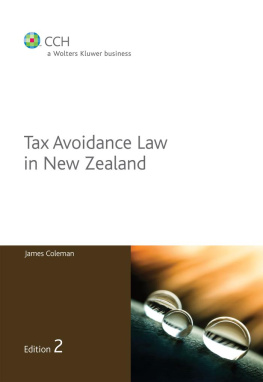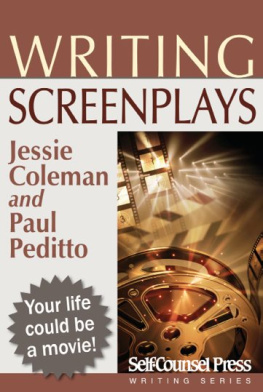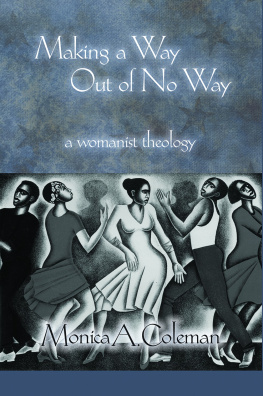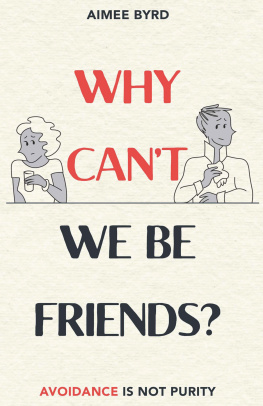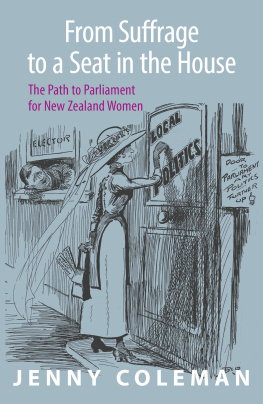Product Information
About CCH New Zealand Limited
CCH New Zealand Limited is a leading provider of accurate, authoritative and timely information services for professionals. Our position as the professionals first choice is built on the delivery of expert information that is relevant, comprehensive and easy to use.
We are a member of the Wolters Kluwer group, a leading global information services provider with a presence in more than 25 countries in Europe, North America and Asia Pacific.
CCH The Professionals First Choice.
Enquiries are welcome on 0800 500 224.
National Library of New Zealand Cataloguing-in-Publication Data
Coleman, James, 1966-
Tax avoidance law in New Zealand / James Coleman. Ed. 2.
Previous ed.: 2009.
Includes index.
ISBN 978-0-86475-984-9
1. Tax evasionNew Zealand. 2. Income taxLaw and legislationNew Zealand. I. Title.
343.9302338dc 23
ISBN 978-0-86475-913-9
2013 James Coleman
Published by CCH New Zealand Limited
First published: August 2009
This edition published: March 2013
All rights reserved. No part of this work covered by copyright may be reproduced or copied in any form or by any means (graphic, electronic or mechanical, including photocopying, recording, recording taping, or information retrieval systems) without the written permission of the publisher.
Printed in New Zealand by Kalamazoo Group Limited
Foreword
This text sets out the law as it pertains to the general anti-avoidance provision in the Income Tax Act 2007 as at the date of publication. New Zealand now has three Supreme Court decisions on tax avoidance. The leading one, and the one most relevant to this text, is Ben Nevis Forestry Ventures Ltd v C of IR; Accent Management Ltd v C of IR (2009) 24 NZTC 23,188, which sets out the key question to be answered whenever the issue of whether an arrangement has the purpose or effect of tax avoidance is raised. It is a judgment in which the court has spent some time setting out broad principles as to how the general anti-avoidance provision is to be interpreted. It is now clear that, having set out the principles, the Supreme Court is leaving lower courts to apply those principles to the cases that come before them.
This is an area of the law that is heavily influenced by case law and, at present, there is an unprecedented amount of litigation involving the application of the general anti-avoidance provision. Hence, it is important for a reader to check whether any case, particularly recent first instance cases, have been appealed since publication. There are also cases that are being heard as this text is published. Hence, this text is intended as a launch pad for research, laying down the key principles and themes, but not excusing a practitioner the need to read judgments issued after publication. Future editions will regularly seek to capture the ongoing jurisprudential development.
In this area of law, advocates on both sides of the fence can become very passionate about their views on the application of the general anti-avoidance provision and the interpretation of the case law. The text merely reflects the current law and does so without any bias towards either taxpayers or the Commissioner. Insofar as the advocates on each side consider aspects of this text to clash with their perceptions of the operation of the section, it will be a testament to its neutrality.
CCH Acknowledgments
CCH New Zealand Limited wishes to thank the following who contributed to and supported this publication:
Managing Director: Bas Kniphorst
General Manager: Julie Benton
Head of Content: Andrew Campbell
Product Manager: Dione Kimpton
Editor: Reshma Korah
Production Team Leader: Yeong Wai Heng
Production Editor: Yeong Wai Heng
Sub-editor: Shanthi Murugiah
Indexer: Logeswari Sivaguru
Cover Designer: Envisage Design
About the Author
James Coleman practises as an independent tax barrister in Wellington. He specialises in tax litigation, with a particular interest in litigating tax avoidance cases. James has appeared in the majority of the leading cases in this area over the last 23 years, having appeared in over 140 reported tax cases overall. Those cases included appearances in the Judicial Committee of the Privy Council and the Supreme Court as well as all other levels of the New Zealand Court System.
Prior to commencing practice as a barrister sole, he was a team leader of the taxation team at the Crown Law office and was made Crown Counsel on his appointment to that role. James teaches the tax avoidance law component of the Masters of Taxation Studies course run by the Auckland University and has done so since its inception. James also writes extensively in tax-related publications and appears regularly as a presenter at conferences on tax topics.
For my family
CHAPTER 1 ANALYSING TAX TRANSACTIONS
1.1 Legal consequences of transactions the governing approach
Taxation outcomes turn on the legal consequences of transactions actually entered into and carried out.
The governing approach is concerned with establishing the rights and obligations that will engage the particular tax provision in question. Thus, if the particular tax provision is a deduction provision, the obligations that create a liability to pay the supplier will be highly relevant. This approach is distinguishable from the method of statutory construction that will be applied. It is independent of concepts like a literal or purposive construction of a provision.
The majority in
Ben Nevis Forestry Ventures Ltd v
C of IR;
Accent Management Ltd v
C of IR (2009) 24 NZTC 23,188 (SC) accepted this orthodoxy saying:
When considering the application of a specific tax provision, before reaching any question of avoidance, the Court is concerned primarily with the legal structures and obligations the parties have created and not with conducting an analysis in terms of their economic substance and consequences, or of alternative means that were available for achieving the substantive result.
This foundational proposition was not accepted by the minority in Ben Nevis. They specifically disagreed with the majority on this issue. This text will follow the logic of the majority as that is the law in New Zealand at present.
Footnotes
IR Commrs v Duke of Westminster [1936] AC 1 (HL), C of IR v Europa Oil (NZ) Ltd 70 ATC 6012 at 6,018; [1971] NZLR 641 (PC) at 648, Europa Oil (NZ) Ltd v C of IR (No 2); C of IR v Europa Oil (NZ) Ltd (No 2) (1976) 2 NZTC 61,066 at 61,07161,072; [1976] 1 NZLR 546 (PC) at 552, Finnigan v C of IR (1995) 17 NZTC 12,170 at 2,17312,174 (CA), Marac Finance Ltd v Virtue [1981] 1 NZLR 586 (CA) at 587 and 588, and the cases cited therein. The Commissioner is bound by those rights and obligations, unless a section like the general anti-avoidance provision applies, see Marx v C of IR; Carlson v C of IR [1970] NZLR 182 (CA) per McCarthy J at 213.
Ben Nevis at [47].
Ben Nevis at [5], footnote 13 and the minority judgment more generally.


